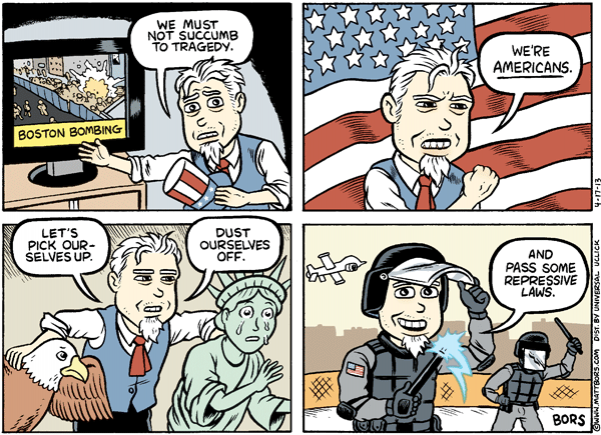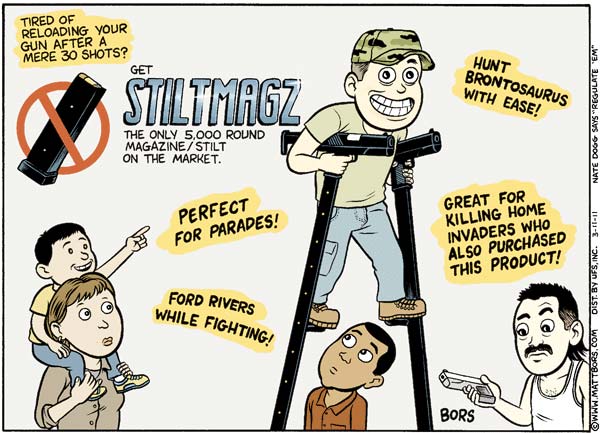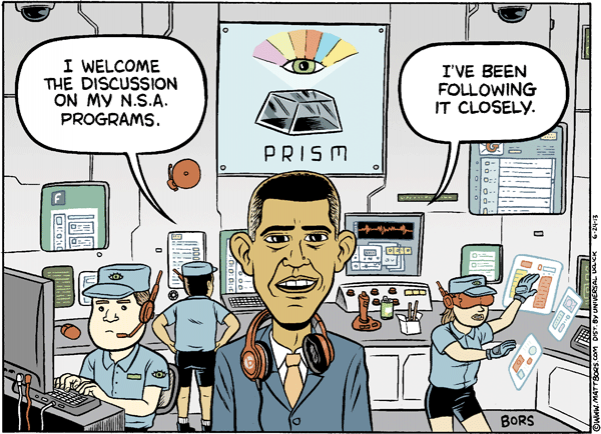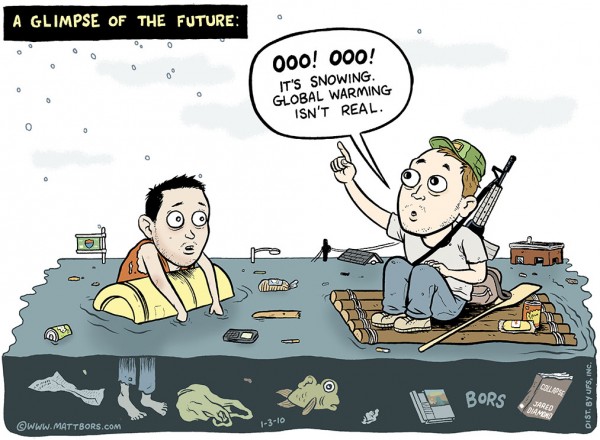 Home > CR Interviews
Home > CR Interviews CR Sunday Interview: Matt Bors
posted June 30, 2013
CR Sunday Interview: Matt Bors
posted June 30, 2013


*****
 Matt Bors
Matt Bors is one of the best editorial cartoonists working and maybe the most important. The
2012 Herblock Prize winner and
same-year Pulitzer finalist has frequently displayed the traditional, crucial skill of boiling down a moment in time to a smart, summary statement that challenges our initial conceptions. Bors also works in a lively style that makes use of strip-comics progressions, is capable of working outside of the editorial cartooning arena if that's where the work takes him, fearlessly criticizes his fellow cartoonists when they rely on tired visual cliches and empty-headed tropes, and seems extremely comfortable on-line. The 29-year-old Portland resident is just over 1000 cartoons into what could be a remarkable career.
Bors' new book,
Life Begins At Incorporation, was crowd-funded into existence. It is a fairly major undertaking, as it includes not only a number of his best cartoons but also a massive run of commentary on individual comics and the issues they engage more generally. I had as much fun reading it as I've had reading any editorial cartoonist collection from the last quarter-century. I urge you to consider buying it, perhaps from Bors himself at one of the many small-press shows he attends -- or at least has been attending. If I had a newspaper to run, Matt Bors would be in my first five hires. -- Tom Spurgeon
*****
TOM SPURGEON: Matt, you wrote an interesting Facebook post right after the bombing at the Boston Marathon that I can't seem to find now where you talked about being criticized for jumping on a story's political elements in a way that some folks feel is exploiting that tragedy. It seems like there are like 18 ways an exploitation argument could be an inauthentic one, but can you unpack a bit what about that specific criticism honked you off enough to make public your objection to it?
MATT BORS: I had seen a few people snarkily inform me on Twitter (as one does) that it was craven of me to jump into the political fallout of the bombings 48 hours after the event. One threw something out there like, "Let them mop up the blood first."

I think people 100% removed from the event, sitting at their computers and trying to dictate the appropriate mourning levels of everyone else is just rancid. There was an urge to strip this attack of its political character and you saw that in the cartoons that came out directly after: images telling us evil is bad and that people are sad. I try to do more substantive work, and I was happy with the cartoon I did. The attack was motivated by politics. The police shut down a city to hunt down the Tsarnev brothers. Senators called for military tribunals. Politics entered into it before the bombs went off.
Whenever national tragedy strikes we want to pretend there's a period were politics doesn't come into play. (9/11 being the best example.) I's how a lot of terrible laws get passed and it's why some good ones don't. I don't buy into it. If I'm ever hurt in a terrorist attack or tagged in a mass shooting, I'll be filing political cartoons about it from my hospital bed.
SPURGEON: The publication of your book seems to me to put a potential capper on an interesting phase in your career, one that began several months with the Herblock Prize, and a Pulitzer finalist nod, and some really good, viral cartoons. Is that a fair assessment, do you think, of your recent professional history? Do you feel like this is an important stage of your career?
BORS: That sounds about right. The book was a long-time coming. I have been at this on some level for a decade now and never collected my work before. The events you mentioned were a big chain for me. I can't say the Pulitzer nod or snagging the Herblock led to a rush of clients, but the prize money freed me. I could afford a moment to pause and decide what it was I wanted to do. I wanted to do a book through Kickstarter it turned out. If I can keep this whole thing going I know I'll look back at 2012 as the year that made set it up.
SPURGEON: I failed to talk to anyone at the end of 2012 about the political season that year... I think partly because I don't remember a lot of memorable cartooning. You're not shy about being critical in terms of your field, generally. Was it a distinguished election season? Were there highlights I missed? Who had the best campaign in terms of the comics they made? Was there a memorable cartoon? Is there one of your you liked more than most?
BORS: Honestly? I can't remember, which may mean there was nothing too memorable, but I tend to hate our year-long campaign cycle and dread its approach every four years. The comics, as with the candidates themselves, tend to be concerned with minute-to-minute horserace coverage and the cataloging every insane utterance and supposed gaffe. I do this myself. It's fun to a point. But rarely are issues discussed, which is what I'm ultimately trying to get at in my work.
I can't think of anything I did during the last campaign that stands out or that I'd recommend. That stuff loses relevancy so quickly. I jettisoned all campaign material from my book, save for
a single Mitt cartoon talking about his pooping habits. (He hires someone to poop for him.)
 SPURGEON: In general, how self-critical are you? Do you assess your work at a remove? Are there cartoons you thought worked very well at the time that you might not have liked as much when you re-examined them later? Is there a cartoon you thought would hit but didn't?
SPURGEON: In general, how self-critical are you? Do you assess your work at a remove? Are there cartoons you thought worked very well at the time that you might not have liked as much when you re-examined them later? Is there a cartoon you thought would hit but didn't?
BORS: A self-critical cartoonist? Never! [Spurgeon laughs] I think I obsess over my shortcomings and second guess my work as much as the next person, but having multiple deadlines a week teaches you to let go a bit. I'm happy with my work. You put things out there that aren't up to par, that you think will hit and then flop, and you just move on to the next cartoon. Not because you aren't a self-loathing artist loaded with insecurities, but because you have a cartoon due in twelve hours and it's time to tackle that one now. And sometimes they take off in big ways and you feel validated. And then you have another cartoon due in 12 hours.
SPURGEON: Matt, what is your marketplace like? I think we all know that it's miserable generally for cartoonists right now, but is it specifically tough for you? Is there anything about the comics work that you do that may make it easier for you than some of these guys in their forties and fifties being fired from staff positions? Do you even think of your career in those terms anymore?
 BORS:
BORS: The market has been terrible, especially since the crash in '08 when altweeklies started dumping comics. A number of websites have now incorporated political cartoons into the mix. Things seem on the rise a bit. I'm also branching out, doing some
comics journalism here and there, and have a longer column-like comics coming out soon on
CNN.com.
Part of the reason I'm doing alright, I think, is that at this point I'm one of the only younger people doing this. I survived an attrition that was pretty thorough. A lot of people who became my friends were doing this in the mid-2000s and they slowly dropped off because they got discouraged or got a good job offer or had a kid. I really miss their work and think things would have been different if the economy was hadn't tanked. Cartooning is brutal. If people tap out I don't blame them.
SPURGEON: With a profession in decline in many ways, why hasn't this had an effect on burning off superfluous, clichéd comics? What is it about the editorial cartooning field that supports bad cartooning?
BORS: I think there has been an effect. Guys who get laid off and only know how to work in that one stilted old style are having a rough go of it. You look at
Jack Ohman; one of the reasons I think he got
the job at the Bee is he's doing comics journalism, writing columns, doing local cartoons. He's proving his worth. If all you can provide is a cookie cutter editorial cartoon on the national debt, go home, you're done. That kind of cartooning that I go after might still have some purchase in daily papers, but check back in ten years when most of these guys are retired (or laid off) and see if that still holds.
I asked my editor at nsfwcorp, Paul Carr, what he thinks of when I say "editorial cartoons" and here's what he told me:
"When I hear editorial cartoon I used to immediately transported to those god awful and awfully unfunny cartoons like the ones parodied by "
Stan Kelly" in
The Onion. Lots of carefully labeled metaphors etc. Somehow managing to neither be good cartoons or good editorial. Clearly, though, there were very funny editorial cartoonists out there:
Garry Trudeau,
Steve Bell etc., etc. -- but few and far between."
SPURGEON: Was being labeled a new editorial cartoonist or an alt-editorial cartoonist useful to you in any way? Who do you consider your direct peers? What is that market like vis-Ã -vis the more general market for editorial cartooning?
BORS: I'm not really sure if most people consider me an editorial cartoonist or an altweekly cartoonist or what. Some people consider me a webcartoonist, and I'm that as well. I think my closest peers are those in the world of altweekly cartoons:
Tom Tomorrow and
Ted Rall and that whole school. They were what I was going for at first. But I don't really like the word "altweekly" since it's limiting and I only run in a small handful of them anyway. Most of my readers are online.
I don't have a problem with "editorial cartoonist" at all, but I think it's closely associated with a certain type of cartooning that isn't really ascendent right now. (To put it nicely.) I'm drawing cartoons for some newer outlets, like
NSFWCorp and
Medium.com, and I don't know that they really think of me as an editorial cartoonist in the traditional sense. [stoner voice] "I'm just Matt Bors, man, and they like what I'm putting out there."
SPURGEON: [laughs] Have any of the ways tossed out there to improve editorial cartooning had any real effect at all on the cartoons being done? Like is there some hidden treasure trove of hyper-local cartooning we're going to discover 15 years from now? Are people experimenting with format? Is there anyone whose skill set you admire in terms of finding new places to settle in?
BORS: You don't really see many people experimenting with format, I'm not hearing much on local cartoons, and I can't think of anyone new getting into this field in the last five years. Zero people. I think that will change but we're looking at a real sharp fall off soon. I'm on my way to
the AAEC convention in Salt Lake as I write this. We've got maybe five members in their thirties?
I'm excited by the developments that have taken place in comics journalism over the last few years. It's gone from a novelty to something of an actual field.
Susie Cagle was hired at
Grist and has been doing illustrated reporting, infograpgics, writing. That might not be "editorial cartooning" but it's more in line with what I want to do more of myself. I think we might see more of these gigs for people with skill sets broader than simply illustrating the news.
 SPURGEON: Can you talk about the provenance of the book as a publishing project, what made you self-publish, how you feel looking back on the kickstarter aspects of it. Why a book right now for you? Why this kind of book?
SPURGEON: Can you talk about the provenance of the book as a publishing project, what made you self-publish, how you feel looking back on the kickstarter aspects of it. Why a book right now for you? Why this kind of book?
BORS: I had shown this book in its early stage to an agent and my syndicate and they passed on it. Anthologies don't sell, they told me. To me this is a book to be sold to the same people buying Daily Show and Onion books for their coffee table. That's a large demographic. I don't have the same name recognition, but I knew at least some people wanted this book. There are probably plenty of other people who would like it but have no clue who I am or that it exists.
After Order Of The Stick made a million dollars on Kickstarter, I devoted a few minutes every morning to combing through site and following projects, trying to figure out how to approach it, and talking to cartoonists who had run successful ones and trying to glean the magic formula. (There isn't one.) A million bucks I probably couldn't get, but 20k seemed within reach.
The self-publishing aspect and all the work that goes into fulfilling all these orders eats up a shit ton of time. But I think the crowdfunding thing works for books on my scale. You'll be lucky to get much of an advance from a comics publisher for a book run of 2500 copies. But with the Kickstarter backers covering the printing, I'm now selling a book through my site for $20 profit with no one taking money off the top. Top Shelf is distributing them into stores that I can't get it into. The numbers start to work.
SPURGEON: More specifically, I'm interested in how text-heavy, how you arranged the book by theme and put a lot of thought into the writing of bridge material between cartoons. Did you have a model there? How long did it take you to complete all of that writing?
BORS: I wrote about 20,000 words in six weeks. That was a deadline I imposed on myself for con season so there was a few thousand dollars worth of sales to incentivize me not sleeping much for a few weeks.
I was putting things into the book right up to the last possible second before it went to the printer. No way I could have done it without hiring an editor, layout person, and someone to deal with the printer.
A lot of people before me have worked in a similar format.
Herblock used to release a book every few years with a substantial writing component to it. You can blast through a cartoon collection but organizing it this way felt like I was offering something a little more valuable to readers. Plus I like writing. It doesn't come to me as easily as drawing, but it wasn't something I was forcing either. I think of comics as primarily a writing job anyway.
SPURGEON: How are you going to come out on the other side, ideally, in terms of having funded your book this way? What is the ideal end result -- a certain amount of money made, just having a book out there, putting your work in certain places...?
BORS: These things aren't huge money makers, at least at the level I'm working at, but what it enabled me to do was focus entirely on my comics and not take on any freelance work I didn't want to. The importance of that to me can't be overstated. I might have to cave to economic reality and take on more commercial work someday, but I don't want to. Right now I'm doing everything I want to do and just going full bore -- MORE LIKE FULL BORS.
 SPURGEON: [laughs] I apologize for the length of this next question and the potential all-encompassing nature of what I'm about to ask. Re-reading all of your work in one place, I'm interested in your political education. I'm not the most politically astute person, so some nuances are lost on me but it seems like you're pretty stridently left-leaning on every single position you take, to the point that you chastise people for their hypocrisy and muddled thinking. Is there a position that you have that might surprise me if I took a second look at it? Are there issues you feel you still struggle with, that you can say are different for you now that they were five years ago? Do you worry at all about embracing an orthodoxy in a way that makes you a rigid thinker?
SPURGEON: [laughs] I apologize for the length of this next question and the potential all-encompassing nature of what I'm about to ask. Re-reading all of your work in one place, I'm interested in your political education. I'm not the most politically astute person, so some nuances are lost on me but it seems like you're pretty stridently left-leaning on every single position you take, to the point that you chastise people for their hypocrisy and muddled thinking. Is there a position that you have that might surprise me if I took a second look at it? Are there issues you feel you still struggle with, that you can say are different for you now that they were five years ago? Do you worry at all about embracing an orthodoxy in a way that makes you a rigid thinker?
BORS: Let's see if I can unpack this in less than 5,000 words.
I try not to be a rigid in my thinking but at some point you decide on certain things that are unlikely to shift again; gays are human, healthcare is a right, god isn't real. I probably have more nuanced views on gun control than you'd think from reading my "Dear Gun Nuts" chapter, but our intellectually dishonest gun culture needs to be brought down a peg and I don't really feel like the minutiae of some of the arguments make for good comics.
You're right that I chastise hypocrisy but, hey, I embody some of it as well. We all do. How I feel about the Supreme Court being "activist" in overturning laws has more to do with whether I agree with the laws than anything else. Five years ago I was a vegetarian and now I'm not. Why? No thinking went into it that I can justify. I admit it. We all contain contradictory beliefs and do our best to pretend it isn't the case.
I don't know if there are any positions I fall out of line with the left about that would surprise you, but once we start talking about "the left" we're in an realm where ideologies are tactics are splintered into a thousand self-righteous factions. I'm always too radical or not radical enough for random strangers on the internet.
The main thing I find myself not being aligned with is this sort of prevailing thing going on in our political and online culture where, on a weekly basis, the hive-mind demands the head of someone who has offended their sensibilities. Usually it's some turd who spouts some racist/homophobic/sexist garbage and ends with televised apologies and them losing their job.
I'm entirely great with calling people out on their shit and trying to rout out these nasty elements from our culture, but this sort of censorious mob mentality starts to form online. I think if Rush Limbaugh is calling a woman advocating for birth control a "slut" on the air, let's push back against the pig and publicly rebuke and mock him. But I'm not going to call SleepMattress and act like I'm never going to buy their product again if they don't pull their ads off a show I never listen to in the first plave. Is the mattress I sleep on now from SleepMattres? I don't even know. People need mattresses, though. Even dummies.
The
Onion's infamous "cunt"
tweet is a good example of what I'm talking about. It was trying to do something and obviously wasn't successful, and I'm not going to tell someone not to be offended by it. I got the arguments against it. But that level of backlash, years of goodwill and good politics completely thrown out the window by people demanding apologies and a lifetime ban on ever reading
The Onion again. When the CEO apologized I didn't get the feeling he genuinely understood the issue at all -- he just wanted the outrage to stop and the full apology is the method to do that now. He sort of threw his writer under the bus by ascribing a nasty motive to them. Again, a misfire of a joke, but it wasn't done maliciously.
Whatever people say about the effect of speech and comedy, intent matters. Intent matters in crime. If you back over a child with your car, whether or not you did so intentionally is going to change how society and the law view you. And if you did it intentionally, wow. Man. What is your deal. But mobs generally don't look at those distinctions.
This is the type of thing that bothers me, and yes, it's partly because I can see it happening to me someday. I don't want to give people a pass for their crap or hide behind a wall of "free speech." I want to give them a hard time for their crap. But the glee we now take in destroying people we don't like or who offend us is troubling to me. It's not the way to win. I've always felt good arguments could be won on their merits.
 SPURGEON: You're critical of President Obama from a perspective on the left, which isn't an uncommon view but maybe one that still gets treated as some sort of novelty. You say at one point you think he's the best we can hope for from the current political system, which sounds a little bit like a strategic talking point rather than a summation of all your individual criticisms. Can you talk about that broader point a bit? Is calling someone a product of a system letting them off for individual choices and mistakes? If you really feel strongly that this is a systemic problem, do you feel anything can be done about it and are there politicians in history that you feel were not the products of the system in a positive way?
SPURGEON: You're critical of President Obama from a perspective on the left, which isn't an uncommon view but maybe one that still gets treated as some sort of novelty. You say at one point you think he's the best we can hope for from the current political system, which sounds a little bit like a strategic talking point rather than a summation of all your individual criticisms. Can you talk about that broader point a bit? Is calling someone a product of a system letting them off for individual choices and mistakes? If you really feel strongly that this is a systemic problem, do you feel anything can be done about it and are there politicians in history that you feel were not the products of the system in a positive way?
BORS: I don't say he's the best they system can produce as a compliment or anything, but, uh, there isn't going to be a revolution tomorrow or the next day. Part of me thinks the only decent thing for politicians to do is all resign tomorrow. There's a lot of things I'd like to see happen but I try to live in reality.
I'm not a great fan of this system we have, but incremental change happens. We're seeing it with gay rights now--that might be more than incremental now that I think of it. Warp speed. But on the economic and foreign policy front I don't see things shifting for the better very soon. We aren't rolling back this pervasive surveillance state. Our election system that produces all these monsters by handing them bags of cash is irretrievably corrupts. It won't change tomorrow, or maybe ever.
I don't admire politicians. I admire outside agitators who were able to push politics and culture in certain directions. In the most high-minded view of my own work, that what I'm trying to do with my tiny cartoons making fun of stuff. Push things in the right direction, or at least offer some resistance to the way they are being pushed.
 SPURGEON: Do you have any thoughts on the nature of the American decline right now, the thing you talk about in so many component parts? Do you see any throughlines just as represented in the various sections of your book? Do you have a sense of what's going on more generally, or is that even a danger in your line of work?
SPURGEON: Do you have any thoughts on the nature of the American decline right now, the thing you talk about in so many component parts? Do you see any throughlines just as represented in the various sections of your book? Do you have a sense of what's going on more generally, or is that even a danger in your line of work?
BORS: I say in the book that the effects of the recession haven't really been fully accounted for yet. An entire generation -- mine -- has been permanently hobbled, I feel. We have this boundless optimism in America, but I don't think there's any reason to believe the good times will return. There's just nowhere to go for us but down. You just can't consume a quarter of the world's resources as a country and build make believe financial instruments and expect to dip out before the bill arrives.
We're staring down a few probable calamities in my lifetime with climate change and resource depletion. That will most likely not be much fun. I'm not like a peak oil guy with my gold bars and beef jerky in the safe, but I don't know. People didn't think the Soviet Union would collapse and then the next day it didn't exist anymore. Very few people see these things coming. Cartoonists will have even les value in the post-apocalyptic future so you can count on me being some mutant's lunch pretty early on.
So yeah, I'm an optimist.
SPURGEON: I wanted to ask an art question to conclude. I was surprised by how consistent your art was considering how young you are. It seems like you've settled into how you're drawing in a way that I don't tend to see from cartoonists that are as young as you are. How deliberate are your style choices, what you do in terms of coloring? How much thought do you give to the look of a piece, and how important do you think it is in terms of how your work has been received?
BORS: I guess my art style is deliberate in that I started out more realistic and had to work to parse it down the first few years I was doing strips. But then, maybe five years ago, it sort of clicked into a pretty consistent thing that you're seeing now. Seems like the older generation of altweekly cartoonists had much more abrasive and experimental styles. I've heard people say that my work is more cartoony and pleasing and that's how I slip the politics in and honestly it's just how I draw and I don't know there was a theory behind it when I started. I'd say my writing has changed more than my art, gotten a bit looser, and I've been (slightly) experimenting with a few things to keep myself from getting bored with churning these out week after week. I can't scoop up that six figure job at a daily paper I have to at least amuse myself.
In terms of coloring I really try to keep the same palette going to have a consistent look. I need to have my work be as recognizable as some editorial cartoons are indistinguishable. To not have your work stand out is death.
*****
*
Life Begins At Incorporation, Matt Bors, Self-Published, Paperback, Full-Color, 240 pages, 2013, $20.
*****
* cover to new book
* photo of Bors from Stumptown 2013
* the Boston Marathon cartoon to which people objected
* the Mitt Romney pooping cartoon referenced
* image from one of Bors' recent comics-journalism projects, a collaboration with the writer Sarah Mirk
* three editorial cartoons of Bors I enjoyed when they appeared that seem to illustrate the issues being discussed, although maybe not that gun one, which I just find funny
* image from a 2006 editorial cartoon, I believe about voter apathy
* another a cartoon of Bors I always enjoyed (bottom)
*****

*****
*****


